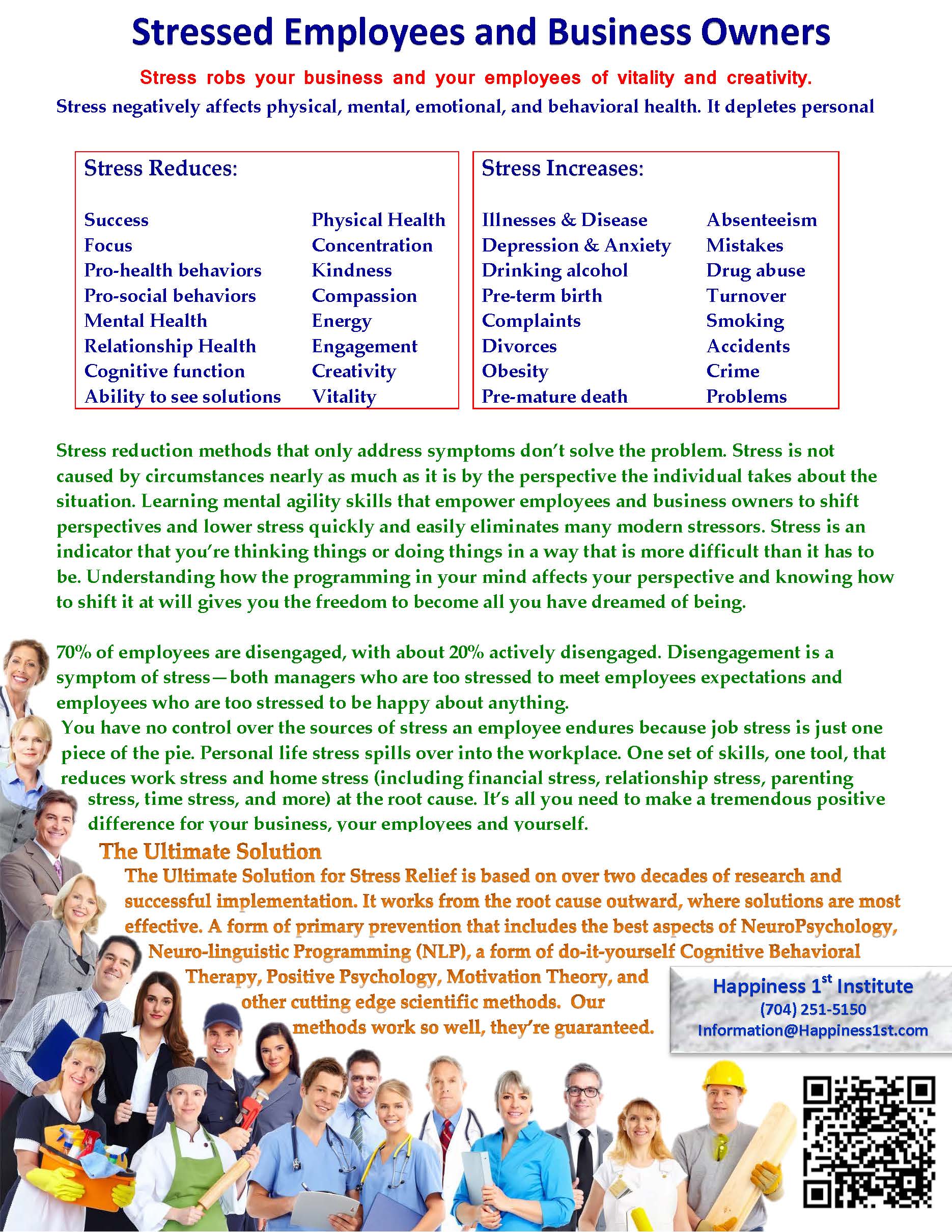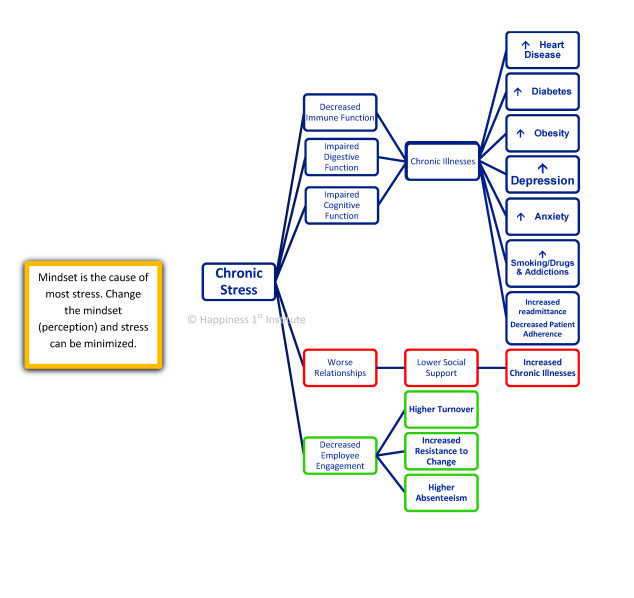Employee Engagement
Recent studies have reported employee engagement levels at or below 30%. Traditional methods of employee engagement attempt to change the corporate culture and management in order to change the employees. But older wisdom tells us that true change must come from within. After decades of using the traditional approach with dismal results (30% of employees are engaged), isn’t it time to give another method a try? The results could hardly be worse.
Burnout in High Stress Occupations
Worldwide, burnout in high stress occupations is taking a toll and causing concerns. This is especially true in the healthcare industry where physicians and nurses are experiencing burnout with two dire consequences. 1) The care they are able to provide is lower as a result of the burnout, and 2) They are leaving the field and taking their years of training,  expertise and experience with them.This is not good for the employees, the employers, or the public. Burnout and lack of employee engagement go hand in hand.
expertise and experience with them.This is not good for the employees, the employers, or the public. Burnout and lack of employee engagement go hand in hand.
We need a better solution and there is a mountain of evidence pointing to resilience as the missing piece. Resilience stands alone as the most important factor in maintaining employee engagement.
“The failure or loss of resilience in physicians leads to burn-out, which is a major concern in medical centres because of its impact on health care.” (Eley et al, 2013)
If you step back and look at the relationship between employee engagement and resilience, it becomes easy to see why addressing engagement by attempting to change the environment instead of strengthening employees is failing.
Perhaps employers are reluctant to spend their resources strengthening employees who can leave the organization. I can see how easy that objection to strengthening employees could be made. I also see how short sighted it is.
Beyond a certain point, the work and work environment is far more important to employees than compensation. If that weren’t true, many occupations would have to pay a great deal more to get anyone to do the work.
Does management affect culture? Yes, of course. But a resilient employee can thrive under a bad manager because that employee will respond in ways that support his or her own continued engagement. Resilience relies heavily on mindset. With the last really bad boss I had, I developed several mantras that helped me remain engaged with the work and the company even though I had no respect or trust for the boss I had caught lying and deliberately wasting company resources. At the time I worked for one of what I call the “Big Box banks” and in my time there my bosses tended to last 6 – 8 months, then I’d report to the Senior Vice President until a new boss was hired. I loved working directly for the SVP because of the mutual respect we’d developed over the years. The main thing I had to do to remain engaged in my role was remind myself that the bad boss would be gone soon.
Okay, yes, that is over simplification. But the other perspectives I took to feel better all flowed easily once that one was in place. Did I thrive? Yes. In fact, it was while working under that boss that I was promoted to Vice President. I also did not stress about him after hours. If my mind began ruminating about what he had done that was irritating, frustrating or infuriating I would remind myself that he would be gone soon, which enabled me to let it go. Was he gone soon? Yes. In fact, I’ve noticed that most really bad bosses don’t last too long–not just for myself but also with friends and family.
Who suffers most under a bad boss? It is not the most vulnerable. I was a single Mom raising two children on my own. It is the one who believe the current problem is going to be permanent. The ones who worry not just about today, but about what it will be like working for that bad boss in six months or six years. It is those who do not believe they can do anything about the situation.
Interestingly, those same traits are associated with depression. Ruminating, anxiety, and unnecessary worry make someone vulnerable–not their life circumstances.
What Difference Does this Make?
If your employees are not resilient, adverse circumstances can quickly lead to a lack of engagement. You cannot control the circumstances the employee works under. There are too many moving parts. You have some control over these parts but no control over most of them. The employer cannot control whether or not the:
- Employee gets adequate sleep before coming to work
- Employee’s children are cooperative while they prepare for the day ahead
- Employee eats breakfast
- Employee argues with members of their family before coming to work (or even during work)
- The morning commute goes well (millions of moving parts here including other drivers being rude, getting a ticket, having an accident, car breakdowns, spilling coffee, heavy traffic, noticing weeds allowed to flourish in a neighbor’s yard, a song on the radio that makes the employee feel sad, flat tires, parking issues, and more)
- Other employees are rude to the employee
- Customers are rude to the employee
- Employee likes the way coffee in the breakroom was prepared
- Employee has minor illnesses or aches/pains (i.e. tension headaches, minor stomach upset, indigestion, sore muscles, etc.)
- Employee is worried about personal finances
- Employee is worried about a child being bullied, skipping school, having sex, drinking, doing drugs, smoking or other undesired activities
- Employee is worried about the health of a personal relationship
- Employee is worried about a loved one for an unlimited number of reasons
- Employee feels loved or appreciated by anyone
- Employee finds meaning in their work (this is a function of perception–not the role)
The above list may seem lengthy but it is far from an exhaustive list of factors that contribute to the employee’s performance on any given day. If the employee works with others, whether bosses, peers, or subordinates each factor would be multiplied by each of the people with whom the employee has interactions.
The bottom line is that the employer cannot control the work environment beyond a very limited scope. How the employee responds to the circumstances has a far greater impact on employee engagement than anything the employer can do. Resilient employees respond to life’s ups and downs in ways that allow them to bounce back. What is a deep valley to an employee who lacks resilience is a mere pothole to the resilient employee.
The Good news is
Resilience is a learnable skill. (Cloninger & Cloninger, 2011)
Resilience leads to desirable traits including:
- Being responsible
- Perseverance
- Psychological and Behavioral maturity
- Cooperation
- Optimism
- Self-direction
Resilience is associated with a lack of unnecessary worry, anxiety, and negative rumination.
Building A Resilient Culture
You can build a resilient culture that will support and encourage engagement by teaching employees skills that increase their personal resilience. Once taught, there will be a natural tendency to support and strengthen that culture.
We all know, intuitively, that we want to feel good. Resilience feels better than the alternative. Working with other people who are resilient creates an atmosphere that is positive and nurturing. There is less competitiveness within the organization and more cooperation toward accomplishing shared goals. There is a greater desire to better oneself because the belief that doing so will have a positive outcome increases in the resilient individual. There is greater focus on solutions and less frustration with problems.
One of my all time favorite quotes is:
“Give a man a fish and you feed him for a day; teach a man to fish and you feed him for a lifetime.” Maimonides
Teaching employees the skills that lead to resilience is like teaching them to fish. Once acquired the skills are used because using them feels better than not using them. In an organization where all employees are being taught the skills the opportunities for positive reinforcement will help them quickly develop new habits of behavior and thought. The way these skills are taught makes individuals more receptive to feedback about course adjustments than they were before.
If you’re not satisfied with your employee engagement numbers or you’re concerned about burnout, contact us today for a free consultation. You’ll be glad you did.
(7O4) 25I…5I5O
P.S. The other great benefit with our program? The way we increase resilience also increases Emotional Intelligence (EQ), an essential trait of leaders who can go the distance.
 Stressed employees and business owners
Stressed employees and business owners











